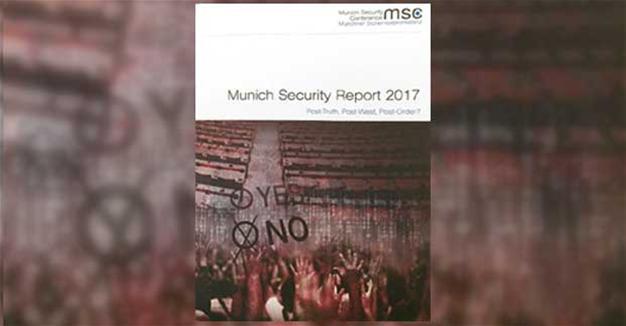Turkish referendum among the Top 10 risks

The official report of this year’s 53th Munich Security Conference on Feb. 17-19 was titled “Post-Truth, Post-West, Post-Order?”
That in itself explains a lot about explorations in the field of security and diplomacy under the new global circumstances symbolized by the election of Donald Trump as the president of the U.S.
The report includes a list of risks facing the world in 2017 published by the Eurasia Group, a New York-based risk analysis foundation. The list does not include crises that have already broken like the Syrian civil war, the NATO-Russia confrontation over Ukraine and the Baltics, or the threat posed by terrorism. But it does list the factors that have the potential to further destabilize global balances, including special mention for Turkey:
1- Independent America: Trump will use U.S. power overwhelmingly to advance U.S. interests with little concern for the broader impact. He is a unilateralist rather than an isolationist, and there will likely be a hawkish U.S. policy regarding China, while allies in Europe and Asia hedge their bets.
2- China Overreacts: Faced with the risk of being criticized at the Communist Party congress in the fall, Chinese President Xi Jinping might want to try to look stronger, which might strain ties with the U.S.
3- A Weaker Merkel: Strong leadership from Germany’s Angela Merkel will face more challenges in 2017 from the French elections, Greece’s financial trouble, Brexit negotiations, and thorny relations with Russia and Turkey. Merkel is likely to win the German election in the fall but will still emerge as a weakened leader.
4- No Reform: Indian Prime Minister Narendra Modi has accomplished as much as he can. In Russia, France and Germany reforms will have to wait for elections, while China faces a leadership transition. Turkish President Recep Tayyip Erdoğan and British Prime Minister Theresa May are occupied with domestic challenges, while reforms in Brazil, Nigeria and Saudi Arabia might fall short.
5- Technology and the Middle East: The ongoing revolution in energy production undermines regimes dependent on oil and gas production. Meanwhile, new communication technologies and cyber-attacks might pose risks to authoritarian regimes from angry citizens.
6- Central banks get political: Western central banks will be increasingly vulnerable to the same sort of crude political pressures that distort emerging economies in 2017. Trump, for example, could put unprecedented pressure on Federal Reserve decisions.
7- The White House and Silicon Valley: Trump wants security and control; tech firms want freedom and privacy for their customers. Trump wants jobs; firms want more automation. The two sides also differ on investment in science.
8- Turkey: President Erdoğan is using the ongoing state of emergency to tighten control of day-to-day affairs in the country. In 2017 he will use a referendum to formalize his powers and his strengthening grip will exacerbate the country’s economic problems, making relations with neighbors and Europe even tenser.
9- North Korea: It is hard to know exactly when North Korea will get the missile capacity that poses a clear and immediate danger to the U.S. But the issue can certainly further strain relations between the U.S. and China.
10- South Africa: Unpopular President Jacob Zuma is afraid of handing over power to someone he doesn’t trust, and domestic struggles will limit South Africa’s ability to help stabilize conflicts in its neighborhood.
Clearly, we have a difficult year ahead. And yesterday, on Feb. 19, there was another example showing that old habits die hard.
In the original program for the Munich Conference there was a panel discussion planned under the title “Old Crisis, new Middle East” which was due to bring the Turkish, Israeli, Saudi and Iranian foreign ministers together on the same podium.
In the end the panel did not happen, and the ministers opted to deliver separate statements. The whisper in the Munich backstage was that Iran’s Javad Zarif wanted to speak before Saudi’s Adel bin Ahmed al-Jubeir.
Despite many changes, perhaps it is still the same old crisis and the Middle East as we have known for many centuries.
 The official report of this year’s 53th Munich Security Conference on Feb. 17-19 was titled “Post-Truth, Post-West, Post-Order?”
The official report of this year’s 53th Munich Security Conference on Feb. 17-19 was titled “Post-Truth, Post-West, Post-Order?”